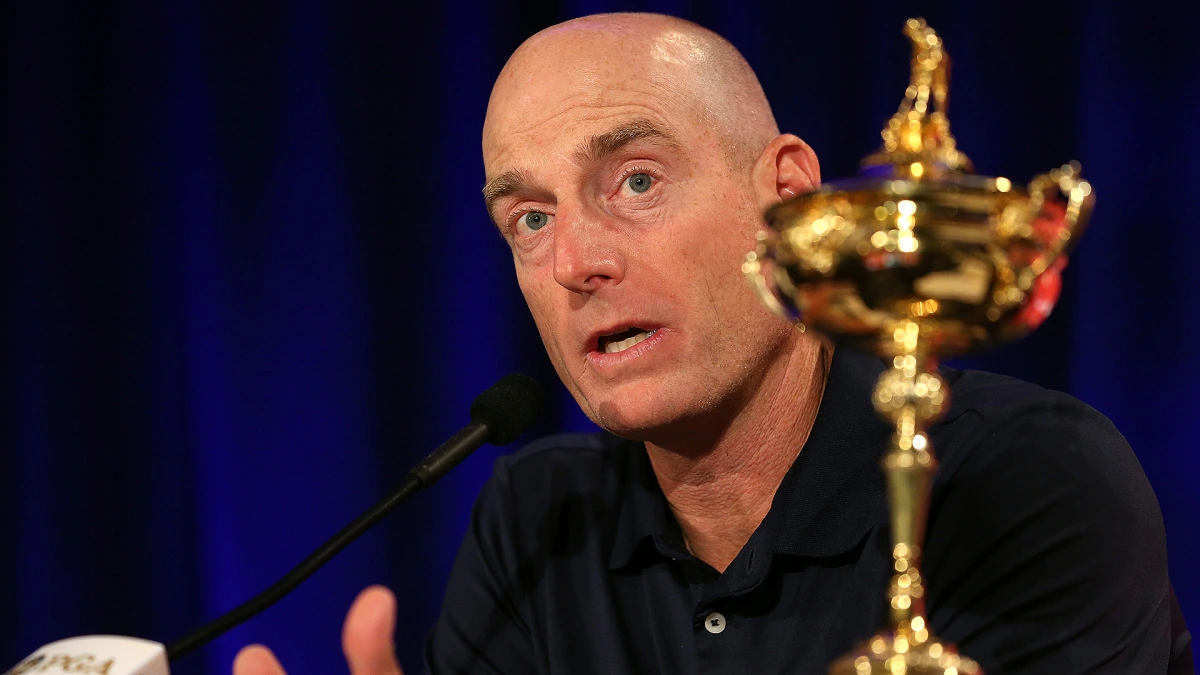Wednesday marks the 25-year anniversary of Davis Love III beating Constantino Rocca in singles, 1 up, to clinch a U.S. Ryder Cup win at The Belfry in England.
Since then, the United States has won the Ryder Cup three times, but never away from home, where the Americans have been outscored by 19 points in five Ryder Cups since held east of the Atlantic.
Phil Mickelson and Tiger Woods have combined for 19 major championships and 18 previous Ryder Cup appearances, but neither player has ever been part of a winning U.S. Ryder Cup team on European soil. So how can the Americans break one of the longest road losing streaks in sports?
Importance of the opening match
Call it equal parts math and momentum – the team that wins the opening match of the Ryder Cup has a decided edge. Since 1975, the team to win the first match of the Ryder Cup has a record of 15-4 (twice in that span, the first match was halved). The United States has only won on European soil three times during that span: 1975, 1981 and 1993. The Americans won the opening match in all three instances.
Improved foursomes performance
At the 2016 Ryder Cup, the U.S. outscored Europe in foursomes, 5½ to 2½. The U.S. was a combined 20-under in those eight matches, 20 strokes better than the Europeans. That is a stark difference to the Americans’ foursomes performance on foreign turf in recent years. Since 2002, Europe has a point differential of +9 in that format on their home soil, winning 21 more holes than the U.S. in that span.
In six of the last eight Ryder Cups, the side that won the most foursomes points went on to win the Ryder Cup. A hot start in this format is especially paramount: since 1985, a team that wins the opening hole of a foursomes match goes on to win a full point 68 percent of the time – and wins at least a half of a point 79 percent of the time.
Player history in this format strongly favors the European side, who’s roster has a combined career record of 25-15-6 in foursomes. The United States? 14-21-11.
American rookies rolling
Despite being a major champion, 9-time PGA Tour winner and former PGA Tour Player of the Year, Justin Thomas is a Ryder Cup rookie this week in Paris. JT makes up one-third of the U.S. rookie contingent, joining Tony Finau and Bryson DeChambeau. The American newcomers pack a punch: that trio features a glistening average world rank of 9.3.
Over the last three Ryder Cups, U.S. rookies are a combined 20-10-5. European rookies are 13-15-2 in that span. To pick up a road win, the U.S. will likely need their rookies to continue the recent strong play.
U.S. stars need to perform
Since 2006, the Americans have been outscored by a combined 15 points in the three Ryder Cups contested in Europe. Each side’s star players are the chief reason why. In those three Ryder Cups (2006, 2010 and 2014), European players ranked in the top-ten in the World Ranking have a combined match record of 25-8-9, good for 0.70 points per match. The Americans in the top-ten are 14-27-5 (0.36 points per match) in that same span.
Contrast that to 2016 at Hazeltine, where the American top-ten players (9-6-2) outplayed their European counterparts (5-8-0).
Live up to the Ranking
The 2018 Ryder Cup features each of the top-ten in the World Ranking for the first time (the Ranking began in 1986). The average World Ranking of the two teams is 15.1 – the best in this event’s history. The U.S. team is especially stout, with a roster featuring an average World Ranking of 11.2 – best of any team in the event’s history. Eleven of the top-17 players in the world are on the American side, and the lowest-ranked player, Mickelson (25), is the most experienced player in U.S. Ryder Cup history.
Three members of the U.S. team – DeChambeau, Thomas and Jordan Spieth – were born in 1993, the last time the U.S. earned a road win in golf’s greatest team event. Their two most senior teammates – Mickelson and Woods – will be 50 and 44 the next time they get the chance to end the losing streak.

Source: Internet
















